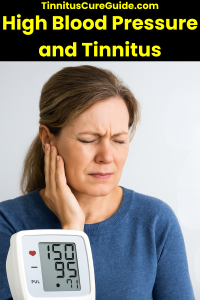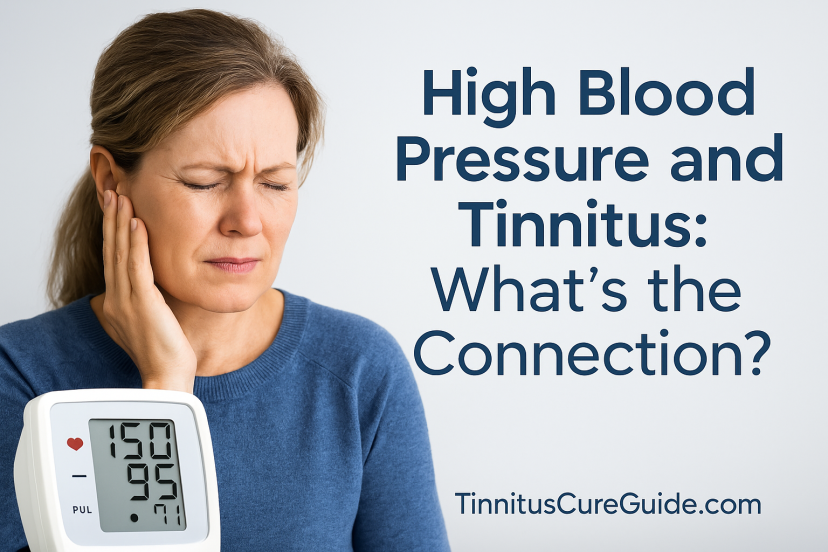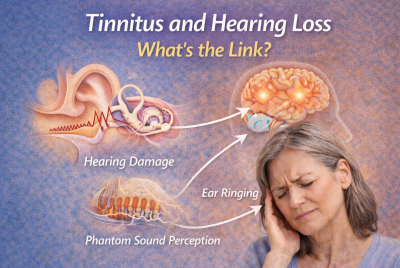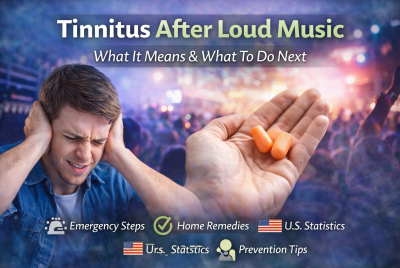High Blood Pressure and Tinnitus: What’s the Connection?
💭 When Ringing Meets Racing: Understanding the Blood Pressure–Tinnitus Link
If you’ve ever noticed your tinnitus getting louder when you’re stressed or your heart is pounding, you’re not imagining things. Many people with tinnitus — that constant ringing, buzzing, or whooshing sound — experience fluctuations tied to blood pressure and circulation.
High blood pressure (hypertension) doesn’t just strain your heart; it can also affect blood flow in the delicate structures of your inner ear, influencing how you perceive sound. The good news? With lifestyle changes, stress control, and the right care, you can support both your heart health and hearing health naturally.
Let’s break down how blood pressure and tinnitus are connected — and what you can do to manage both effectively.
❤️ How Blood Pressure Affects Tinnitus
🧠 The Role of Circulation in the Inner Ear
Your inner ear is extremely sensitive to blood flow. Tiny hair cells in the cochlea rely on a steady supply of oxygen-rich blood to send sound signals to the brain. When circulation is disrupted — as with hypertension — these cells can become stressed or damaged, leading to tinnitus symptoms.
High blood pressure can cause:
-
Turbulent blood flow in nearby vessels (creating a “whooshing” or “pulsing” sound in sync with your heartbeat).
-
Reduced oxygen delivery to the cochlea, intensifying ringing or buzzing.
-
Long-term hearing changes from vessel stiffness and reduced elasticity.
According to the Centers for Disease Control and Prevention (CDC), about 1 in 3 U.S. adults has high blood pressure, and many are unaware — meaning a large number could be experiencing circulation-related tinnitus without realizing the link.
🔊 Types of Tinnitus Related to Blood Pressure
Not all tinnitus sounds the same. When hypertension or circulation is involved, it often presents in specific ways:
1️⃣ Pulsatile Tinnitus
You hear a rhythmic pulsing that matches your heartbeat. This usually indicates vascular (blood vessel) causes, including high blood pressure, anemia, or plaque buildup.
2️⃣ Intermittent or Fluctuating Tinnitus
The ringing changes in volume depending on your stress, anxiety, or caffeine intake — all of which can temporarily elevate blood pressure.
3️⃣ Chronic Ringing with Hypertension
Long-term high blood pressure can damage the small arteries that nourish your ear, leading to persistent, high-pitched ringing over time.
If your tinnitus is one-sided or pulsatile, an ENT or audiologist should evaluate it to rule out vascular conditions like arteriovenous malformations or carotid artery disease.
⚡ Common Triggers Linking Hypertension and Tinnitus
Several everyday factors can spike blood pressure and aggravate tinnitus symptoms:
-
High sodium intake (processed foods, restaurant meals)
-
Stress and anxiety
-
Caffeine or energy drinks
-
Alcohol and nicotine
-
Lack of sleep
-
Sedentary lifestyle
🧘♀️ Tip: Track your tinnitus patterns in a journal — note what you ate, your stress levels, and any changes in your routine. Over time, patterns can reveal specific triggers that raise both your blood pressure and tinnitus volume.
🩸 How Hypertension Damages Hearing Over Time
When blood pressure remains high for years, it can weaken and narrow the blood vessels throughout the body — including those that feed your ears. This leads to:
-
Chronic inflammation in auditory pathways
-
Reduced blood flow to inner ear structures
-
Microvascular damage to hearing nerves
Studies in the American Journal of Otology have found a significant link between long-term hypertension and sensorineural hearing loss in older adults. Managing blood pressure early is key to preserving hearing function.
🌿 Natural Ways to Improve Blood Flow and Calm Tinnitus
Healthy circulation supports not just your heart, but your ears and brain as well. Try incorporating these natural strategies to improve blood flow and reduce tinnitus intensity:
🥗 1. Eat a Heart-Healthy Diet
Focus on:
-
Leafy greens (spinach, kale) for magnesium
-
Omega-3-rich fish (salmon, mackerel) for vascular elasticity
-
Berries and citrus fruits for antioxidants
-
Limit sodium to under 1,500 mg/day
🍅 Bonus: A DASH-style diet (Dietary Approaches to Stop Hypertension) is proven to reduce blood pressure and improve inner ear blood flow.
🚶 2. Stay Active
Regular movement keeps your cardiovascular system strong. Aim for:
-
30 minutes of brisk walking 5x a week
-
Gentle yoga or tai chi for stress balance
-
Stretching to promote circulation in the neck and head
🌿 3. Support Circulation with Natural Supplements
Research suggests that certain supplements may improve blood flow and support hearing:
-
Ginkgo biloba: Improves microcirculation in the cochlea.
-
Magnesium: Protects against noise-induced hearing damage.
-
CoQ10: Supports heart and vascular health.
-
Vitamin B12: Essential for nerve protection.
Always consult your doctor before starting new supplements, especially if you’re taking blood pressure medication.
🧘♀️ 4. Manage Stress and Anxiety
Stress spikes cortisol and blood pressure — and can make tinnitus feel louder. Try:
-
Deep breathing (4-7-8 technique)
-
Progressive muscle relaxation
-
Mindfulness meditation apps like Headspace or Calm
-
Listening to white noise or nature sounds during stressful moments
🩺 When to See a Doctor or Audiologist
While mild tinnitus can often be managed with lifestyle adjustments, some signs indicate a need for medical attention:
-
Tinnitus that beats in sync with your pulse (pulsatile)
-
Ringing that’s sudden or one-sided
-
Accompanying hearing loss, dizziness, or pressure
-
High blood pressure that’s hard to control with lifestyle changes
-
Ear pain, drainage, or visible swelling
An ENT or audiologist may perform:
-
Blood pressure monitoring and cardiovascular assessments
-
Hearing and imaging tests (audiogram, MRI, CT scan)
-
Medication review (some hypertension drugs may worsen tinnitus)
If your doctor confirms a blood pressure connection, managing hypertension through medication, stress reduction, and diet can significantly improve tinnitus outcomes.
🔊 Treatment Options for Blood Pressure–Related Tinnitus
1️⃣ Medical Treatments
-
Antihypertensive medications (ACE inhibitors, beta-blockers, calcium channel blockers) to stabilize blood flow.
-
Addressing underlying vascular conditions, like arteriosclerosis or carotid artery issues.
2️⃣ Sound Therapy
-
White noise machines, tinnitus maskers, or hearing aids with built-in sound therapy can reduce tinnitus perception.
3️⃣ Behavioral Therapy
-
Cognitive Behavioral Therapy (CBT) helps reframe emotional responses to tinnitus.
-
Tinnitus Retraining Therapy (TRT) blends sound and counseling for long-term habituation.
4️⃣ Complementary Therapies
-
Massage or acupuncture may reduce muscle tension and improve circulation.
-
Mindful breathing promotes relaxation and lowers blood pressure naturally.
🌈 Prevention Tips: Protect Your Ears and Heart Together
The best way to manage blood pressure and tinnitus is through prevention and consistency.
💆♂️ Daily Self-Care Checklist
✅ Monitor blood pressure regularly (home BP monitor).
✅ Stay hydrated — dehydration thickens the blood and reduces flow.
✅ Limit caffeine and alcohol.
✅ Eat potassium-rich foods (bananas, avocados).
✅ Sleep 7–8 hours nightly to balance blood pressure.
✅ Take “quiet breaks” each day to reduce stress and mental strain.
These small habits protect both circulation and inner ear health, reducing your risk of chronic tinnitus over time.
❓ FAQs About Blood Pressure and Tinnitus
1️⃣ Can high blood pressure really cause tinnitus?
Yes. Hypertension affects blood flow to the inner ear and can cause ringing, pulsing, or whooshing sounds in some people.
2️⃣ What does pulsatile tinnitus sound like?
It’s often described as a rhythmic pulsing that matches your heartbeat — a sign of vascular involvement or high blood pressure.
3️⃣ Can lowering my blood pressure stop the ringing?
If tinnitus is blood flow–related, improving cardiovascular health can reduce its intensity or frequency.
4️⃣ Which medications for hypertension can make tinnitus worse?
Some diuretics or beta-blockers may have tinnitus as a side effect. Always consult your doctor before changing medication.
5️⃣ Does stress increase both tinnitus and blood pressure?
Absolutely. Stress raises blood pressure and heightens tinnitus perception. Relaxation techniques are key for both conditions.
6️⃣ How can I improve inner ear blood flow naturally?
Exercise, hydration, and supplements like ginkgo biloba or CoQ10 can help maintain healthy circulation.
7️⃣ Should I see a cardiologist for tinnitus related to blood pressure?
If your tinnitus is pulsatile or your hypertension is difficult to control, yes — a cardiologist can help identify vascular causes.
🌿 Final Takeaway: Balance Your Heart, Calm Your Ears
Tinnitus can feel overwhelming, but when high blood pressure is part of the picture, the path to relief is often clear — support your circulation, and your ears will thank you.
Through mindful living, stress control, and proper medical guidance, you can create lasting balance between your heart health and hearing wellness. Each step toward lower blood pressure is also a step toward a quieter, calmer life.
⚕️ Medical Disclaimer
This article is for informational purposes only and should not be considered medical advice. Always consult a qualified physician, ENT, or audiologist before starting or changing any treatment related to blood pressure or tinnitus.

- Diet and Tinnitus: What Foods Help or Hurt Your Ears
- Can Earwax Cause Tinnitus?
- Matcha Tea and Tinnitus






